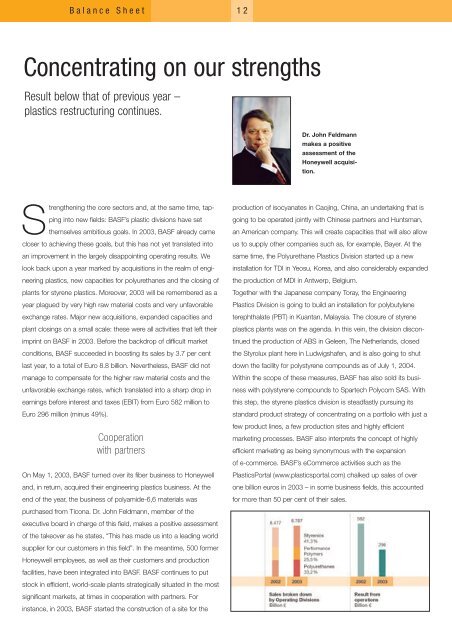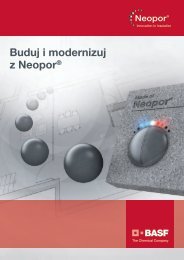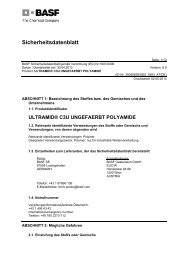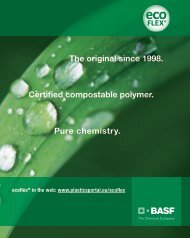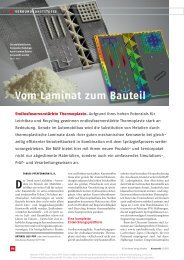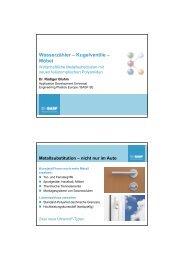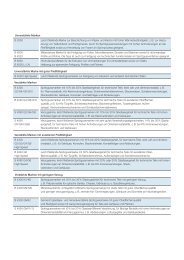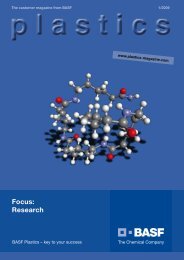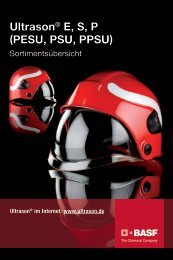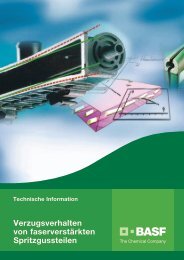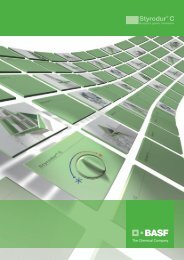Drucken plastics 01_04 _E_dp - BASF Plastics Portal
Drucken plastics 01_04 _E_dp - BASF Plastics Portal
Drucken plastics 01_04 _E_dp - BASF Plastics Portal
Create successful ePaper yourself
Turn your PDF publications into a flip-book with our unique Google optimized e-Paper software.
Balance Sheet 12<br />
Concentrating on our strengths<br />
Result below that of previous year –<br />
<strong>plastics</strong> restructuring continues.<br />
Strengthening the core sectors and, at the same time, tapping<br />
into new fields: <strong>BASF</strong>’s plastic divisions have set<br />
themselves ambitious goals. In 2003, <strong>BASF</strong> already came<br />
closer to achieving these goals, but this has not yet translated into<br />
an improvement in the largely disappointing operating results. We<br />
look back upon a year marked by acquisitions in the realm of engineering<br />
<strong>plastics</strong>, new capacities for polyurethanes and the closing of<br />
plants for styrene <strong>plastics</strong>. Moreover, 2003 will be remembered as a<br />
year plagued by very high raw material costs and very unfavorable<br />
exchange rates. Major new acquisitions, expanded capacities and<br />
plant closings on a small scale: these were all activities that left their<br />
imprint on <strong>BASF</strong> in 2003. Before the backdrop of difficult market<br />
conditions, <strong>BASF</strong> succeeded in boosting its sales by 3.7 per cent<br />
last year, to a total of Euro 8.8 billion. Nevertheless, <strong>BASF</strong> did not<br />
manage to compensate for the higher raw material costs and the<br />
unfavorable exchange rates, which translated into a sharp drop in<br />
earnings before interest and taxes (EBIT) from Euro 582 million to<br />
Euro 296 million (minus 49%).<br />
Cooperation<br />
with partners<br />
On May 1, 2003, <strong>BASF</strong> turned over its fiber business to Honeywell<br />
and, in return, acquired their engineering <strong>plastics</strong> business. At the<br />
end of the year, the business of polyamide-6,6 materials was<br />
purchased from Ticona. Dr. John Feldmann, member of the<br />
executive board in charge of this field, makes a positive assessment<br />
of the takeover as he states, “This has made us into a leading world<br />
supplier for our customers in this field”. In the meantime, 500 former<br />
Honeywell employees, as well as their customers and production<br />
facilities, have been integrated into <strong>BASF</strong>. <strong>BASF</strong> continues to put<br />
stock in efficient, world-scale plants strategically situated in the most<br />
significant markets, at times in cooperation with partners. For<br />
instance, in 2003, <strong>BASF</strong> started the construction of a site for the<br />
Dr. John Feldmann<br />
makes a positive<br />
assessment of the<br />
Honeywell acquisition.<br />
production of isocyanates in Caojing, China, an undertaking that is<br />
going to be operated jointly with Chinese partners and Huntsman,<br />
an American company. This will create capacities that will also allow<br />
us to supply other companies such as, for example, Bayer. At the<br />
same time, the Polyurethane <strong>Plastics</strong> Division started up a new<br />
installation for TDI in Yeosu, Korea, and also considerably expanded<br />
the production of MDI in Antwerp, Belgium.<br />
Together with the Japanese company Toray, the Engineering<br />
<strong>Plastics</strong> Division is going to build an installation for polybutylene<br />
terephthalate (PBT) in Kuantan, Malaysia. The closure of styrene<br />
<strong>plastics</strong> plants was on the agenda. In this vein, the division discontinued<br />
the production of ABS in Geleen, The Netherlands, closed<br />
the Styrolux plant here in Ludwigshafen, and is also going to shut<br />
down the facility for polystyrene compounds as of July 1, 20<strong>04</strong>.<br />
Within the scope of these measures, <strong>BASF</strong> has also sold its business<br />
with polystyrene compounds to Spartech Polycom SAS. With<br />
this step, the styrene <strong>plastics</strong> division is steadfastly pursuing its<br />
standard product strategy of concentrating on a portfolio with just a<br />
few product lines, a few production sites and highly efficient<br />
marketing processes. <strong>BASF</strong> also interprets the concept of highly<br />
efficient marketing as being synonymous with the expansion<br />
of e-commerce. <strong>BASF</strong>’s eCommerce activities such as the<br />
<strong>Plastics</strong><strong>Portal</strong> (www.<strong>plastics</strong>portal.com) chalked up sales of over<br />
one billion euros in 2003 – in some business fields, this accounted<br />
for more than 50 per cent of their sales.


